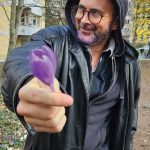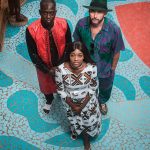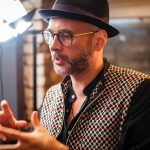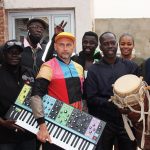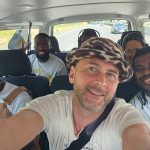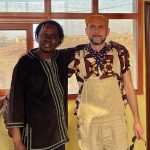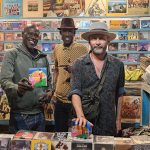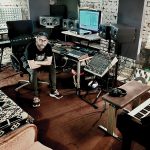Ex-Pat Files: Aron Ottignon
Ex-Pat Files: Aron Ottignon
For several years now, Tāmaki Makaurau-born pianist and composer Aron Ottignon has been based in Berlin, creating unique and diverse music that blends musical styles and cultures; fusing jazz, pop, global influences and electronic effects. He has collaborated with renowned artists like Stromae and Woodkid, been signed with legendary jazz label Blue Note and recently launched his own international label, Urban Trout Records. Aron very generously answered NZM’s questions about his musical life in Berlin and well beyond.
Do you remember your first impression on visiting Berlin, and what led to you actually moving your life there?
My first visit to Berlin was for a show with my old band, Aronas, at the Haus der Kulturen der Welt in 2005. I remember my best friend from NZ, who was living in Berlin at the time, took me clubbing. It was a memorable night with snow outside but a hot rave inside, filled with people on drugs and amazing house music. Not a bad first experience.
The original vinyl is still available on discogs.
I moved there after securing a nice studio setup in Kreuzberg, courtesy of a rap band I met who let me take over their three-room music studio in the heart of the neighbourhood. It was an exciting opportunity. However, adjusting to life in Germany wasn’t easy.
I was already living in France, so I thought I was prepared for European bureaucracy, but dealing with French administration was nothing compared to what I encountered in Germany! Managing health insurance, taxes, and navigating the complex administrative system was a nightmare. I soon realised that at least 40% of my income from freelance music-making wasn’t mine to keep, leaving me with the challenge of making ends meet with the remaining 60%. It was a steep learning curve, but one that ultimately helped me grow both personally and professionally.
My advice for exploring Europe – consider options beyond Berlin’s hyped up music scene, the entire EU is accessible and affordable for exploration. The open borders make travel within it simple.
Can you give us a quick run-down of your studio set up?
Currently, two of the three rooms are rented out to FLINTA, an all-female queer production crew. My room is about 20sq m and fully equipped for production, featuring an acoustic piano, Juno-106, Moog Matriarch, DSI Tempest drum machine, plenty of percussion instruments, high-quality microphones, an Antelope Audio soundcard and Adam A77X monitors along with Genelec speakers. I’m producing mainly on Ableton, but am also working on Logic and experimenting with FL Studio.
German isn’t an easy language – how are your verbal skills?
Learning new languages has been challenging for personal reasons. I started with beginner French, then moved on to beginner German! While you can get by with English in the short term, I believe it’s important to make an effort out of respect. However for someone like me it can take at least 10 years to become comfortable with a language. Now I’m revisiting French due to my work in West Africa. I think I will be fluent in French one day, it’s a goal of mine now. (No disrespect to Germany meant!)
What area do you live in, and what do you like about it?
When I left NZ, via Sydney, my initial plan was to move to New York, but visa issues led me to London instead. Unable to afford rent, I stayed with friends in West London before finding a musician-friendly place in North London. In Paris and Berlin I relied on recommendations from friends to locate affordable artist areas. However, the challenge of finding affordable accommodation persisted, and the neighbourhoods more or less always chose me. Today, I’m living out of my suitcase, but I have three music studios, one in Berlin, one in France, one in Senegal.
In Berlin my studio is conveniently located next to Gretchen, a venue that hosts music almost every night of the week, featuring international acts spanning jazz, roots, funk, electro, and more – truly eclectic. In Paris, Le Gare Le Gore is an exciting new venue on the scene. Marseille’s Babel Music is a fantastic hub for global music sounds. Currently I’m exploring the Dakar underground scene, where you can find great spots to set up bands, overlooking the Atlantic Ocean.
I’ve been visiting Senegal for three-month stints as that’s the maximum stay allowed, however during my last visit some music industry contacts mentioned they would help me extend my stays in the future. Typically, I leave Berlin in November, escaping the winter, and stay until March, a pattern I’ve maintained consecutively since 2021. (Originally, I had planned to visit NZ for the summer, but maybe next time I’ll be bringing Senegalese musicians with me!)
How did you initially find your musical footing in a huge city like Berlin?
Actually I never quite found my musical footing in Berlin. Despite maintaining an international career I only made occasional appearances for concerts there. Overall, I haven’t felt fully embraced by the Berlin music scene as I have in other cities or countries – I’m still trying to figure out what went differently. Perhaps my reluctance to follow trends played a role. In Berlin it seems like people gravitate towards group identities, especially in music. For various reasons it’s easier for them to do so. However, I couldn’t conform to that. I’ve become a bit of a musical loner in Berlin, but I’ve made peace with that.
What would you say is your biggest professional achievement in music since relocating?
Live Performance: One of my biggest achievements in live performance was performing at the Montreal Jazz Festival with my band, Aronas in 2010. The entire world tour surrounding that event was a highlight of my career.
Writing: Another significant accomplishment was writing the piano parts for Stromae’s hit Papaoutai, which has accumulated over one billion streams to date!
Have you got any stories that are archetypical Berlin you can share?
Before I had moved to Berlin, my band had a gig in Kreuzberg. One of my musicians, whom I won’t name, was of Afro-Caribbean descent. Following our gig we went to an after-party nightclub. It was packed with mainly Germans and white people. Unfortunately, my musician colleague, being the only black person, was constantly approached by people asking for drugs. Literally, every second person assumed he was selling pills just because he was black. Eventually, my musician buddy found the actual drug dealer in the club. He decided to buy all the pills off him for a good price, then proceeded to sell them at a higher price. He made some good money. I know this is totally illegal and wrong, but it made sense at the time, lol.
What are the main differences you appreciate most about being based in Europe?
If I were to move back to NZ, I would prioritise learning about the diverse cultures and especially languages present there. Europeans embrace multilingualism and cultural appreciation, which is something I would like to bring back home one day. I have a dream of incorporating these influences into a project in NZ. It’s something I’m passionate about discussing, although I’m not ready to reveal the details just yet!
Oh, here’s something incredible: I recently met Baaba Maal’s band and struck up a friendship with their keyboardist. Can you believe it? I actually saw them perform in Auckland at WOMAD back in the ’90s when I was just a teenager. And guess what? They even remember that gig! I explained to them how I thought they were super musicians sent from outer space at that time…
You’ve been incredibly prolific in recent years and working with high calibre musicians’ musicians from across the globe. By way of example, how did the Baaba Maal collab come about?
The Senegalese percussionist for Youssou Ndour and Baaba Maal approached me after hearing about my work with Stromae. Baaba Maal heard the demo I made and agreed to collaborate with me. Additionally, my time with Universal Music France opened up many opportunities. I worked with top artists like Abd Al Malike, Woodkid, and Louane.
I’m still pinching myself about what’s going on! Incredibly talented artists are reaching out to work with me, which is surreal considering there are so many amazing producers in France, Germany, and the UK, where there are large Senegalese communities.
One reason it’s working so well is that I’m an experienced touring jazz pianist. I can cut rhythms pretty well and hold my own on stage during heavy jams, earning the nod of approval. Another key point is that, in terms of record labels, it’s mainly Universal Music with its presence next door in Ivory Coast. Now, with my own independent and artist-run label, it feels good. I truly believe I’m in the right place at the right time. What we need now is support for the label to help musicians get this amazing music made, bring financial support to their family and communities.
Here’s a fun fact about Senegal; gigs don’t start until 2am, seven nights a week. I love it, it’s every musician’s dream. We sleep in, have a late lunch, work on music in the afternoon, take a siesta, then in the evening, we eat dinner and get ready to spend the entire night out listening to music everywhere. There’s a saying; Dakar Don’t Sleep.
In those kind of ‘I was asked to collaborate’ circumstances, what does your role most typically involve?
Questions on how various collaborations take place, or start, open up a whole new conversation in my opinion. Especially when considering all the different revenue streams musicians are supposed to manage: songwriting; arranging; producing; content creation; live concerts; streaming; Web3; Patreon; YouTube; tutorials; lessons; workshops and more. It’s an overwhelming list, and artists need to have a grip on what to focus on. That’s where I like to mentor. Depending on the artist, I can collaborate on most areas – it all depends on the project.
You also now have established your own label in France, Urban Trout Records. Why so?
When I left Blue Note France and Universal Music Publishing, it wasn’t an easy decision, but I wasn’t comfortable. Everyone warned me it would be tough to bounce back from that, and they were right. Maybe reconnecting with Baaba Maal from my childhood saved my career. After leaving Blue Note, I lost my booking agent, PR partners, and all gigs. Even my Instagram got randomly deleted, which was a sign things were going downhill! However, Stromae’s return from retirement gave me a boost.
I’m a Kiwi jazz musician without an easy target audience. I know I’m not a label’s dream artist – Blue Note had a nightmare marketing me, so I left. For two years I sent the finished Senegal album to labels, but no one had the time or budget. So, I used my royalties from Stromae and set up Urban Trout Records. I’m drowning in paperwork and have no capital, but I love what I’m doing and the journey. I pray for some financial success, not for myself, but for all the people working tirelessly behind the scenes for nothing.
I initially started my Urban Trout Records label unofficially in Berlin, but it was my larger network in France and new projects in Francophone Africa that made it logical to establish the company there. I aim for it to become a strong independent label in the future, breaking down trends and supporting artists with integrity. Already, Senegalese artists are approaching me, and I hope to provide opportunities for New Zealanders looking to expand their palette internationally, particularly in soul and jazz.
Urban Trout is here to evolve; it’s independent and free. It’s about unity. Unless another label comes in with a compelling offer, Urban Trout will remain the go-to label worldwide. We’ve recently partnered with some cool teams, but it’s still early days. Let’s see what an artist-run label looks like in 2025!
What have you got planned for the second half of 2024 and beyond?
2024 is shaping up to be intense. With the Aron & The Jeri Jeri Band album out, we’re now gearing up to release music videos with the last of our funds. Additionally, we have our sights set on signing three incredible artists in West Africa this year. If we can secure support and some cool partners, the music will be made. On top of that I’m producing a UK steel pan album, and my new project, the Aron Ottignon Experiment, is launching, with offers to play in the UK and Germany coming in. Furthermore, another Aron Ottignon album is set for release before the end of the year. It’s a lot to handle, and I have to thank my business partner, Nane Kahle, for working with me full-time on all of this. Let’s see what unfolds!
Thanks for the interview. On a final note, I hope people can subscribe to my mailing list www.urbantroutrecords.com I’ll also have a new Patreon in the next few weeks to help grow my community and engage more closely with fans. I invite people to not get too sucked into subscription models. Supporting artists directly is the way.


